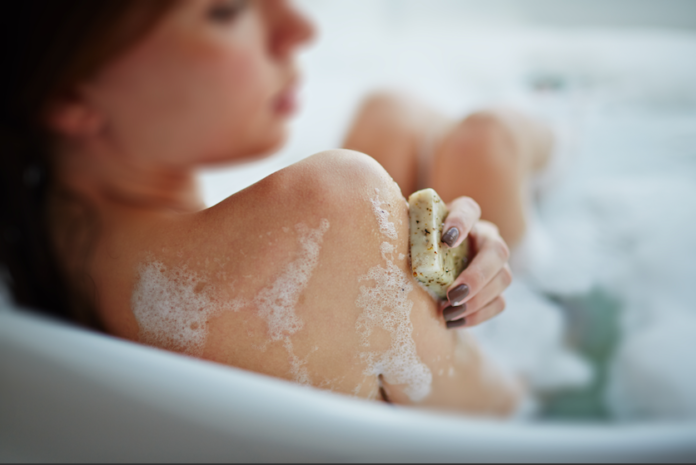There’s arguably nothing more relaxing than a warm bath after a long day.
Many adults bathe their children routinely, but also enjoy a bath themselves to unwind.
But besides a simple moment of zen and bubbles… are we actually getting clean?
Shower vs. Bath
Most people tend to be one or the other: shower advocates or bath believers.
Both are rejuvenating and relaxing, but the argument usually surrounds which is cleaner.
You may have heard someone say, “a bath is just sitting in your dirt” and it turns out there may be some truth to that. It’s not necessarily your dirt, but according to a study by the Center for Hygiene and Health in Home and Community at Simmons College in Boston, your bathtub can have up to 100 times more bacteria than your trash can. Yikes!
Bad Rep for Baths
Which nasty organisms are living in your beloved tub? Bacteria such as e. Coli, streptococcus, and staphylococcus aureus are just a few that have been found. One of the reasons bathtubs proliferate bacteria growth is that they rarely dry out completely, and moisture encourages a breeding ground for bacteria.
It’s bad enough NYU microbiologist Dr. Phillip M. Tierno says that soaking in a bathtub is like sitting in “bacterial soup”. However, the reality is that the human body is built to resist these common bugs.
If you have an open wound, that would be the time to be most concerned about the cleanliness of your bathtub, to reduce the chance of an infection. Beyond that, chances are that the worst thing that will happen (as a result of a long soak in the bathtub) is dry and flaky skin.
Hot showers can also cause dry skin too. This depends on prolonged exposure to warm water — baths tend to go on a bit longer than showers for most people.
Safe Bathing
Moving forward, play it safe by taking the Hygiene Council’s recommendation of disinfecting tubs and showers twice a week to clean up any germs hanging around.
The bathtub is no more a petri dish of germs than your kitchen faucet, sponge, or even your cell phone. With diligence, you can feel secure that your bath is clean and therefore cleaning you.
Some people might even rinse off in the shower pre-bath, to make sure they experience a truly clean soak. Something to consider is that humans shed about 30,000 skin cells per hour, so you can imagine your bath quickly becomes yucky with the germs that ride along with those dead skin cells. So, do yourself a favor, rinse off in the shower before you bathe.
When you’re finished bathing, consider a quick post-rinse as well, to be thorough. This is important to rid your body of any leftover soap residues or contaminants, especially for children who enjoy bubble baths. Also, avoid letting the shower curtain hang into the bath, this is a quick way to contaminate your bath water with bacteria.
What About My Kids?
You’re likely not going to convince your cohabitants under the age of 10 to opt for a shower over a bath. That’s okay, just be aware kid’s skin is more sensitive than adults so be diligent with cleaning the tub before bath time and spray down the tub with a disinfectant at least twice per week.
Another thing to watch out for is bath toys. The majority of parents innocently leave toys in the bathtub for the next bath time. However, most bath toys have tiny holes that hold moisture and become pockets of bacteria growth. Remove and dry toys off well after each bathing.
Keeping it Clean
While a sponge with some bleach and elbow grease will certainly do the trick, there are less caustic and chemical-free ways to kill off bacteria in your bathtub. Some people opt for hydrogen peroxide mixed with other household items such as baking soda, lemon juice, and vinegar to create a bleach alternative.
You could always buy a chemical-free cleaner off the shelf, luckily there are plenty of options these days as more people have become aware of and sensitive to common household chemicals.
Don’t Fear the Bath
There are benefits to the bath! Don’t be turned off by the bacteria, which is preventable if you’re proactive with cleaning and take my advice to pre and post rinse.
Taking a bath is still a great way to treat skin and muscle issues. It’s easy to add natural ingredients, essential oils, and other therapeutic bath treatments to the water. For example, Epsom salt helps with aches and pains, and oatmeal or even honey may help with eczema, irritated skin, and sunburns.
Taking a bath to relax is a big benefit and worth considering, as our mental health strongly dictates and affects our physical health. As I’ve mentioned in previous articles, you’ll benefit from a healthy heart to strength and lung capacity. Taking a warm or hot bath reduces mental stress, and according to research: it can even make you feel less lonely.
—
While we’ve learned that baths are problematic for bacterial growth, we also know the body is designed to fight off these germs. If you routinely clean your tub, it won’t grow out of safety standards.
Bath believers rejoice! Enjoy your relaxing soak, just do a quick rinse-off before and after.








